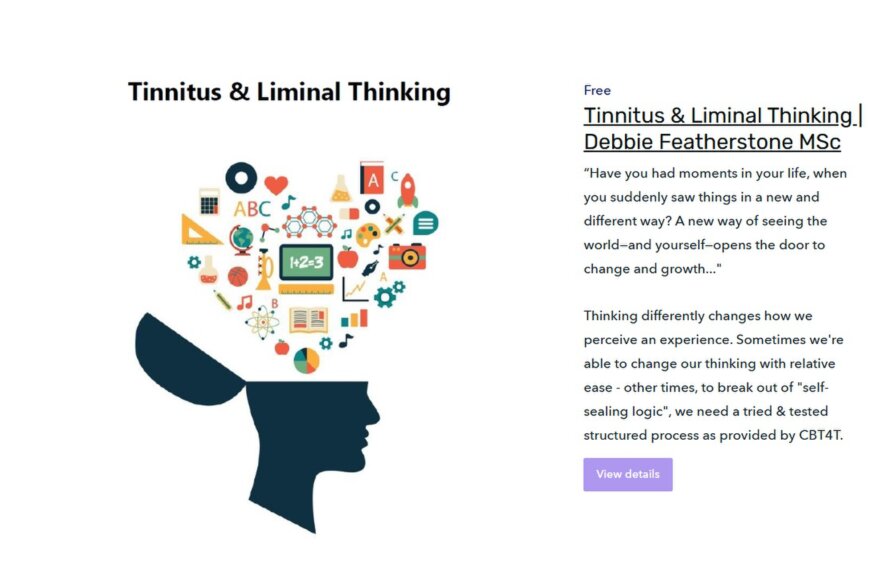A new way of thinking is needed to change how YOU perceive YOUR tinnitus
Do you:
- Hate your tinnitus?
- Want your tinnitus to go away?
- Battle with your tinnitus?
- Feel unhappy and frustrated by your tinnitus?
Let’s turn each of those questions in to statements:
- I hate my tinnitus
- I want my tinnitus to go away
- I battle with my tinnitus
- I feel frustrated by my tinnitus
Whether you use those words as voiced statements, or internal-dialogue (thoughts) or non-verbal feelings, you are creating distress for yourself.
1. I hate my tinnitus
How does it make you feel when you tell yourself you hate something?
Take a look at the Emotion Wheel (Fig.1) below
Of the 7 groups of emotions identified (middle of wheel), what are the emotions generated by feeling HATE for something?
- Happy? Probably not!
- Surprised? Possibly
- Bad? Probably
- Fearful? Probably
- Angry? Probably
- Disgusted? Possibly
- Sad? Probably
Emotion Wheel

Fig.1 Emotion Wheel
Using the wheel, jot down TEN of the strongest emotions you feel about your tinnitus and give each of them a percentage of how strong you feel the emotion:
1._____________________________ 6.__________________________
2._____________________________ 7.__________________________
3._____________________________ 8.__________________________
4._____________________________ 9.__________________________
5._____________________________ 10._________________________
What are the top THREE and their percentages?
1.
2.
3.
2. I want my tinnitus to go away
I am quite sure you do! However, how realistic do you think it is? From a practical perspective, wishing something away is impractical, even counter-productive.
3. I battle with my tinnitus
I have heard this from thousands of people over the past 30+ years!
Here is my response: “Choose to pick a battle with tinnitus and I guarantee you will lose!”
Why can I guarantee you will lose?
When we have a sense of being “against”, or “fighting” or “battling” etc. we trigger neurotransmitter (brain chemicals) production that prepares us for “fight” (part of the “fight, flight, freeze” state). This produces a sharp increase in “arousal” (Sympathetic Nervous System activity) and where tinnitus is already a problem, tinnitus loudness perception is simultaneously increased.
4. I feel frustrated by my tinnitus
Search for the meaning of this. A couple of definitions of "frustrated" from Oxford Dictionaries might help:
“Feeling or expressing distress and annoyance resulting from an inability to change or achieve something”
“Prevented from progressing, succeeding, or being fulfilled”
How can we create a new type of thinking?
There are many more than these 4 – all be they common - perceptions about tinnitus. You may share one, two or more of these examples, and have others you could add.
And whether you use those words as voiced statements, internal-dialogue (thoughts) or non-verbal feelings, you are creating distress for yourself.
The GOOD news is that YOU DON’T HAVE TO!
The distress – in whatever form it is taking in your life – stems from beliefs.
Although they may be your beliefs, where did you get them from?
Did they just “pop up” out of nowhere? – Absolutely NOT! You learned them at some point in the past, and your SUB-conscious created its interpretation of that learned experience.
Beliefs are created layer upon layer, experience on top of experience, and we rarely think of challenging what we think we know already.
Liminal Thinking
Excerpt from “Liminal Thinking” by Dave Gray
“Have you had moments in your life, when you suddenly saw things in a new and different way? A new way of seeing the world—and yourself—opens the door to change and growth.
You can cultivate a way of thinking and being that will allow you to have these breakthrough insights more often. Through that new way of thinking, you will be able to guide others to similar mind shifts that will give them the power to transform their lives. This way of thinking is a practice you can use to find and create new doorways to possibilities, doorways that are invisible to others.
I call this practice liminal thinking.
The word liminal comes from the Latin root limen, which means threshold.
The idea behind liminal thinking is that there are thresholds, doors of opportunity, around you, all the time. Most of them are invisible to you, because you are focusing on other things. But they are there, they are real, and they offer incredible potential for growth and change. Tuning your mind to liminal thinking will help you see opportunities that others will be unable to see or even imagine. It’s a kind of psychological agility that enables you to create change where others cannot.” (D. Gray, 2016 pp.xx)
“Liminal” means boundary, or threshold.
Several years ago, I came across the book “Liminal Thinking” by Dave Gray. I read it from cover to cover and found it to be extraordinarily insightful! I also quickly realised that it was something I had been asking my patients to do for years without knowing it!
In fact, liminal thinking is what ALL therapists – and doctors, teachers, trainers, coaches, bosses, supervisors, even politicians ask of others. Even parents when they are attempting to change their child’s behaviour!
Fundamentally, we are all “trapped” in our beliefs by a bubble of “Self-sealing logic”.
Yet, when what led us to being in this bubble is broken down in to its component parts, it was based on a single conscious idea out of millions of SUB-conscious bits of our total experience at any given moment in time. The reference for this goes back to a Neuroscientist called Manfred Zimmerman in 1973.
Quote: “ Zimmermann estimates that your conscious attention has a capacity of about 40 bits per second. That’s a tiny, tiny fraction of what you can perceive: 40 bits out of a potential 11 million. That’s 10,999,960 bits of information that you sense but don’t notice, every second.” (D.Gray, 2016)
Here's a great video by Dave Gray explaining Liminal Thinking:
Or go straight to the video on YouTube:
The video is 12:28 long, so grab yourself a cuppa and enjoy!
After watching the video
Think of the Elephant as being “Tinnitus” and what you believe about it.
And when you are ready to start making changes – coming OUT of your bubble escaping the self-sealing logic that’s kept you in it – start making changes.
Change your story, enrol on CBT4T to start making the necessary changes.
Complete a Tinnitus Functional Index (TFI): www.cbt4tinnitus.com/tfi
Website: https://www.tinnituseprogram.org
Course site: https://courses.tinnituseprogram.org
View CBT4T course: https://courses.tinnituseprogram.org/cbt4t-2025
CBT4T Substack: https://cbt4t.substack.com
It is free to be a CBT4T Substack Subscriber. The CBT4T Substack is for:
• Anyone supporting others who have tinnitus, such as Audiologists, Hearing Therapists, and those in a tinnitus-support/helping role
• Anyone with tinnitus enrolled or not yet enrolled on the CBT4T programme
Debbie Featherstone MSc
Hearing Therapist & Psychotherapist
CBT4T | CBT for Tinnitus E-Programme
Updated: August 2025

